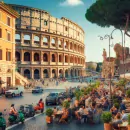
Latin languages, also known as Romance languages, are a group of languages that originated from Latin, the language of the Roman Empire. Today, Latin languages are spoken by millions of people worldwide and are an important part of global culture and communication.
The Latin language evolved from an Indo-European language spoken in ancient Italy. During the Roman Empire, Latin became the dominant language in Europe and was used as the language of administration, education, and literature. As the Roman Empire declined, Latin evolved into a number of regional dialects that eventually developed into distinct languages.
The Romance languages are the modern-day descendants of Latin. They include Spanish, Portuguese, French, Italian, Romanian, and Catalan, among others. While these languages share many similarities, they have also developed distinct characteristics that make them unique.
Spanish, for example, is spoken by over 500 million people worldwide and is the second most spoken language in the world after Mandarin. Spanish has a rich history and is the official language of 21 countries, including Spain, Mexico, and much of Central and South America.
Portuguese is another important Latin language spoken by over 220 million people worldwide. It is the official language of Portugal, Brazil, and several African countries. Portuguese is known for its musicality and is often considered one of the most beautiful languages in the world.
French is spoken by over 300 million people worldwide and is the official language of France, Canada, and many African countries. French is known for its complex grammar and rich literature, and it remains an important language in diplomacy, international organizations, and business.
French is a Romance language spoken by over 300 million people worldwide, and is the official language of France, as well as many other countries such as Canada, Switzerland, and several African nations. French is known for its complex grammar, rich literary tradition, and global influence, making it an important language for diplomacy, international organizations, and business.
The French language evolved from Latin in the 9th century in what is now modern-day France. During the Middle Ages, French became the language of the courts and nobility in Europe, and it continued to evolve into the modern language spoken today.
French is known for its nuanced pronunciation, which includes nasal vowels and liaison (linking) between words. Its grammar is complex, with numerous verb conjugations and grammatical rules. However, once you learn the basics, French can be a beautiful and rewarding language to speak and write.
In terms of vocabulary, French has influenced many other languages, particularly English. It's estimated that around 45% of English words come from French, including many common words such as "restaurant," "tourist," and "umbrella."
French literature is also renowned around the world, with authors such as Victor Hugo, Gustave Flaubert, and Marcel Proust, among others, contributing to its rich literary tradition. French cinema, music, and art are also widely celebrated, with French cultural icons such as Brigitte Bardot, Édith Piaf, and Claude Monet, among many others.
Learning French can open up opportunities for travel, business, and cultural exchange. Whether you're interested in exploring French cuisine, literature, or art, or simply want to broaden your horizons by learning a new language, French is a beautiful and rewarding language to learn.
Italian is spoken by over 85 million people worldwide and is the official language of Italy, Switzerland, and the Vatican City. Italian is known for its beauty and musicality, and it has a rich artistic and cultural heritage.
Italian is a Romance language spoken by over 85 million people worldwide, primarily in Italy, but also in parts of Switzerland, San Marino, Vatican City, and other countries around the world. Italian is known for its musicality, rich cultural heritage, and global influence, making it an important language for travel, business, and cultural exchange.
The Italian language evolved from Latin in the 10th century in what is now modern-day Italy. During the Renaissance, Italian became the language of literature, art, and culture in Europe, and it continued to evolve into the modern language spoken today.
Italian is known for its musicality and melodic rhythm, with its pronunciation featuring long vowels and rolled "r" sounds. Its grammar is relatively simple, with consistent verb conjugations and grammatical rules.
In terms of vocabulary, Italian has influenced many other languages, particularly English. It's estimated that around 30% of English words come from Italian, including many common words such as "pasta," "pizza," and "opera."
Italian literature, art, and cuisine are renowned around the world, with authors such as Dante Alighieri, Petrarch, and Italo Calvino contributing to its rich literary tradition. Italian art, with iconic works such as Michelangelo's Sistine Chapel and Leonardo da Vinci's Last Supper, continues to inspire and captivate audiences worldwide. Italian cuisine is also celebrated, with dishes such as pizza, pasta, and gelato being enjoyed around the world.
Learning Italian can offer a range of opportunities, whether you're interested in exploring Italian culture and history, studying abroad in Italy, or conducting business with Italian-speaking countries. The language has a rich cultural heritage, and learning Italian can help you better appreciate the art, literature, and cuisine of Italy.
Romanian is spoken by over 25 million people worldwide and is the official language of Romania, Moldova, and parts of Serbia and Ukraine. Romanian has a unique history and is the only Romance language spoken in Eastern Europe.
Catalan is spoken by over 11 million people worldwide and is the official language of Catalonia, Valencia, and the Balearic Islands in Spain. Catalan has a distinct identity and is an important symbol of regional identity and culture.
Overall, Latin languages are an important part of global communication and culture. They offer a rich and diverse range of literature, music, and art, and they continue to evolve and adapt to the changing world. Whether you're interested in learning a new language or exploring different cultures, Latin languages offer a wealth of opportunities and experiences.
Recent Posts

Understanding Translation Serv...

Agenzia di Traduzione a Roma: ...

Die Essentielle Rolle von Übe...

Die Essentielle Rolle von Übe...

Die Essentielle Rolle von Übe...

La Traduction Assermentée: Un...
Share it.
© Copyright 2022 LLC


